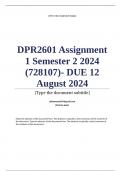[TYPE THE COMPANY NAME]
DPR2601 Assignment
1 Semester 2 2024
(728107)- DUE 12
August 2024
[Type the document subtitle]
tabbymwesh59@gmail.com
[Pick the date]
[Type the abstract of the document here. The abstract is typically a short summary of the contents of
the document. Type the abstract of the document here. The abstract is typically a short summary of
the contents of the document.]
, Book
Public Relations Research
DPR2601 Assignment 1 (COMPLETE ANSWERS) Semester 2 2024
(728107)- DUE 12 August 2024 ; 100% TRUSTED Complete, trusted
solutions and explanations
1. Define the following foundations of universal knowledge and use at least
one possible example in each of them to show how errors in human inquiry
can occur: 1.1. Tradition (2) 1.2. Media myths (2) 1.3. Common sense (2) [6]
2. Neuman (2013) identified ten threats to internal validity. Define and explain
any two of these threats with at least one example of each. [4] 3. Explain
using your own words, how quantitative and qualitative methodological
approaches differ from each other? [6] 4. Neuman (2011) identified various
types of quantitative research designs, including experimental design and
quasi design. 4.1 In your own words, identify and discuss three designs
associated with an experimental design (6) 4.2 Mention any three types of
quasi-. experimental designs and discuss how they differ in terms of their
characteristics. (6)
1. Groundworks of General Information and Instances of Blunders in
Human Request
1.1 Practice (2)
• Definition: Custom alludes to well established traditions,
convictions, or practices that individuals keep on following essentially in
light of the fact that they have consistently done as such. These
customs are frequently acknowledged without scrutinizing their
legitimacy or pertinence in the cutting edge world.
• Model: In certain societies, it's conventional to stay away from
specific food sources during pregnancy, accepting it could hurt the
child. Nonetheless, in the event that this conviction isn't experimentally
upheld, it could prompt superfluous dietary limitations, which could




